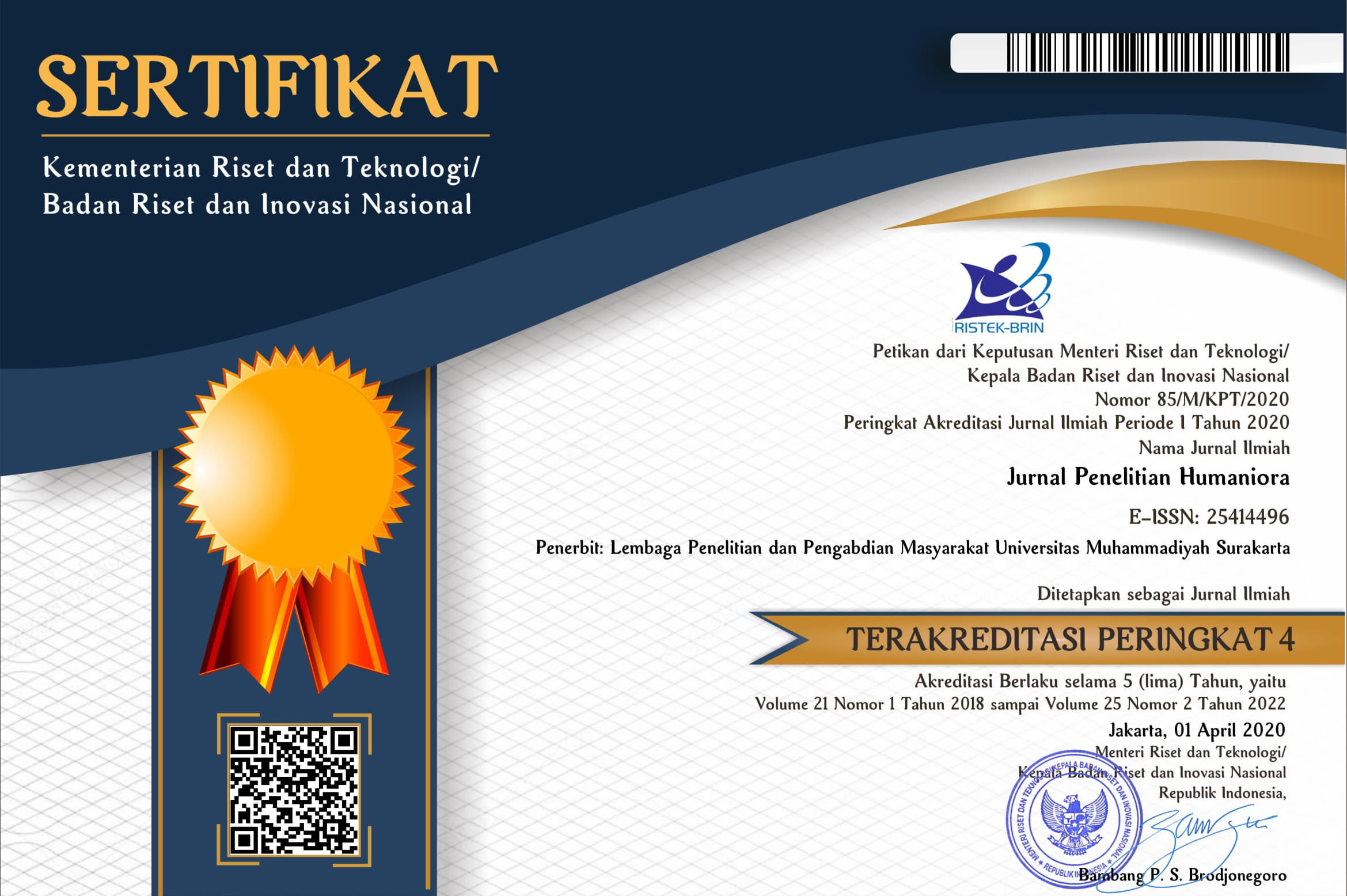HEDONISM REFLECTED ON CELEBRITIES INSTAGRAM (CELEBGRAM) ACCOUNT
Nariza Ayu Pasha(1*), Khalifah Fathonia Gumay(2)(1) Universitas Muhammadiyah Surakarta
(2) Universitas Muhammadiyah Surakarta
(*) Corresponding Author
Abstract
Keywords
Full Text:
PDFReferences
Al-Bahrani, A., & Patel, D. (2015). Incorporating Twitter, Instagram, and Facebook in economics classrooms. Journal of Economic Education, 46(1), 56–67. https://doi.org/10.1080/00220485.2014.978922
Apaolaza, V., Hartmann, P., Diehl, S., & Terlutter, R. (2011). Women satisfaction with cosmetic brands: the role of dissatisfaction and hedonic brand benefits. Article in African Journal of Business Management, 5(August 2015), 1–15. http://www.academicjournals.org/AJBM
Aprilita, D., & Listiyani, R. H. (2016). Representasi kecantikan perempuan dalam media sosial instagram (analisis semiotika roland barthes pada akun @ mostbeautyindo , @ Bidadarisurga , dan @ papuan _ girl ). Paradigma Universitas Negeri Surabaya, 04, 1–13.
Atli, A., Akkaya, M., & Şad, S. N. (2021). Tattooing: A popular way of self-expression among university students. Current Psychology. https://doi.org/10.1007/s12144-021-01389-0
Baum-baicker, C. (1985). Key words: Alcohol - Edoderate consumption - Psychological benefits. Elsevier Scientific Publishers Ireland Ltd., 15.
Bowen, G. A. (2009). Document Analysis as a Qualitative Research Method. Qualitative Research Journal, 9(2, pp.27–40). https://doi.org/https://doi.org/10.3316/QRJ0902027
Choi, G. Y., & Lewallen, J. (2018). “Say Instagram, Kids!”: Examining Sharenting and Children’s Digital Representations on Instagram. Howard Journal of Communications, 29(2), 140–160. https://doi.org/10.1080/10646175.2017.1327380
Duarte, F. (2019). Berapa banyak waktu yang dihabiskan rakyat Indonesia di media sosial? BBC World Service. https://www.bbc.com/indonesia/majalah-49630216
Eriva, E., & Payuk, T. (2020). Semiotic analysis in instagram logo. IDEAS Journal of Language Teaching and Learning, Linguistics and Literature, 4778, 332–339. https://doi.org/10.24256/ideas.v8i1.1383
Hasibuan, L. (2019). Buka-Bukaan Anya Geraldine: Jadi Selebgram Pintu Awal Rezeki. Cnbcindonesia.Com. https://www.cnbcindonesia.com/lifestyle/20190623144657-33-80070/buka-bukaan-anya-geraldine-jadi-selebgram-pintu-awal-rezeki
Intan P., N., Rahmi Pratiwi, M., & Muna, N. (2020). Identitas sosial dan hedonisme di laman pribadi selebgram. Channel Jurnal Komunikasi, 9(2), 99–108.
Karlia, L. (2018). An analysis of hedonism in oscar wilde’s the picture of dorian gray. University of Sumatera Utara.
Koca, E., Vural, T., & Koc, F. (2013). An evaluation of consumer tendencies towards hedonistic shopping for clothes. European Journal of Research on Education, October 2016, 54–55.
Lee, E., Lee, J., Moon, J. H., & Sung, Y. (2015). Pictures speak louder than words : motivations for using instagram. Cyberpsychology, Behaviour, and Social Network, 18(9), 552–556. https://doi.org/10.1089/cyber.2015.0157
Lestari, D. (2019). Slide gambar pada akun instagram @jurnaliskomik: kajian semiotik roland barthes (Vol. 3). Universitas Muhammadiyah Sumatera Utara.
Lu, L., & Hu, C. H. (2005). Personality, leisure experiences and happiness. Journal of Happiness Studies, 6(3), 325–342. https://doi.org/10.1007/s10902-005-8628-3
Mario, V. (2021). Awkarin Ungkap Asal Mula Namanya, Ternyata Berawal dari Twitter. Kompas.Com. https://www.kompas.com/hype/read/2021/04/06/202200866/awkarin-ungkap-asal-mula-namanya-ternyata-berawal-dari-twitter
Monanda, R. (2017). Pengaruh media sosial Instagram terhadap gaya hidup hedonis di kalangan followers remaja. Jom Fisip, 4(2), 4.
Murray, D. C. (2015). Notes to self: the visual culture of selfies in the age of social media. Consumption Markets and Culture, 18(6), 490–516. https://doi.org/10.1080/10253866.2015.1052967
Novitasari, L., Turnip, S., Wulan, R. R., Mei, R., Malau, U., Komunikasi, P. I., Komunikasi, F., Telkom, U., Telekomunikasi, J., & Batu, T. B. (2016). Babystagram phenomenon among indonesia celebrities instagram accounts : semiotic analysis on photographs at babystagram account. Proceeding of The 3rd Conference on Communication, Culture and Media Studies, 167–172.
Nurhayati, H. (2021). Share of Instagram users Indonesia 2021, by age groupe. Statista. https://www.statista.com/statistics/1078350/share-of-instagram-users-by-age-indonesia/#statisticContainer
Nursaniyah, F. (2021). Profil Rachel Vennya, Selebgram Tanah Air yang Jadi Sorotan. Kompas.Com. https://entertainment.kompas.com/read/2021/10/14/105202066/profil-rachel-vennya-selebgram-tanah-air-yang-jadi-sorotan
Olszanowski, M. (2014). Feminist self-imaging and instagram: tactics of circumventing sensorship. Visual Communication Quarterly, 21(2), 83–95. https://doi.org/10.1080/15551393.2014.928154
Purwanto, P. (2021). #I envy, therefore, I buy! #: the role of celebgram trustworthiness and para-social interactions in consumer purchase intention. Jurnal Manajemen Dan Kewirausahaan, 23(2), 186–196. https://doi.org/10.9744/jmk.23.2.186-196
Risti, Y. E. (2010). The influence of hedonism in socialite community toward the main character jenny humphrey in cecily von ziegesar’s gossip girl.
Sari, R. N. (2018). Hedonism in confessions of a shopaholic novel by sophie kinsella. University of Muhammadiyah Sumatera Utara.
Sheldon, P., & Bryant, K. (2016). Computers in human behavior instagram : motives for its use and relationship to narcissism and contextual age. Computers in Human Behavior, 58, 89–97. https://doi.org/10.1016/j.chb.2015.12.059
Smith, L. R., & Sanderson, J. (2015). I’m going to Instagram it! an analysis of athlete self-presentation on instagram. Journal of Broadcasting and Electronic Media, 59(2), 342–358. https://doi.org/10.1080/08838151.2015.1029125
Syahreza, M. F., & Tanjung, I. S. (2018). Motif dan pola penggunaan media sosial Instagram di kalangan mahasiswa program studi pendidikan ekonomi UNIMED. Jurnal Interaksi, 2(1), 61–84.
Tahar, A., Rizkia, L. M., & Hariyanto, E. (2020). Taxing Celebrity Social Media Endorsements Income: A Preliminary Study of Instagram Celebrities. Journal of Accounting and Investment, 21(3). https://doi.org/10.18196/jai.2103167
Tyer, S. (2016). Instagram : What Makes You Post ? Pepperdine Journal of Communication Research, 4, 30–39.
Wahyudi, A. (2019). Jadi YouTuber Terkaya, Ini Awal Mula Karier Ria Ricis. Feedme.Id. https://www.feedme.id/hiburan/54854/jadi-youtuber-terkaya-ini-awal-mula-karier-ria-ricis
Yan, Y., & Bissell, K. (2014). The Globalization of Beauty: How is Ideal Beauty Influenced by Globally Published Fashion and Beauty Magazines? Journal of Intercultural Communication Research, 43(3), 194–214. https://doi.org/10.1080/17475759.2014.917432
Yarbil, N. B., & Argaç, N. (2017). A first analysis of instagram photo content and user types. Frontiers of Mathematics in China, 12(1), 247–260. https://www.aaai.org/ocs/index.php/ICWSM/ICWSM14/paper/view/8118/8087
Article Metrics
Abstract view(s): 431 time(s)PDF: 452 time(s)
Refbacks
- There are currently no refbacks.











